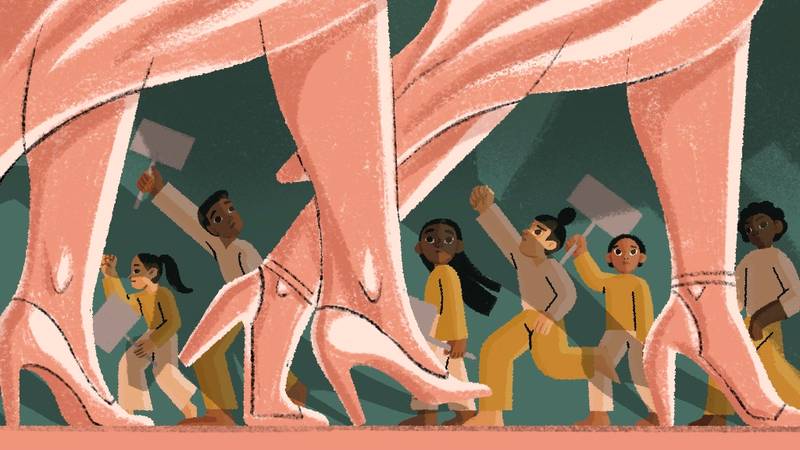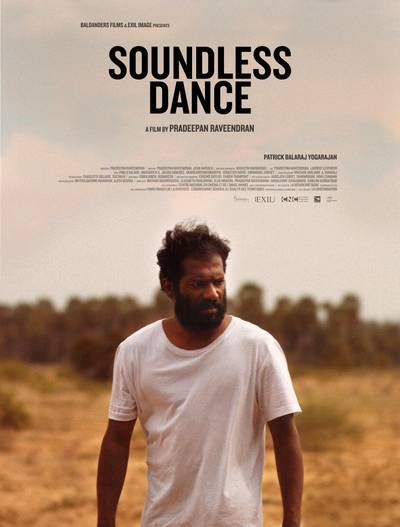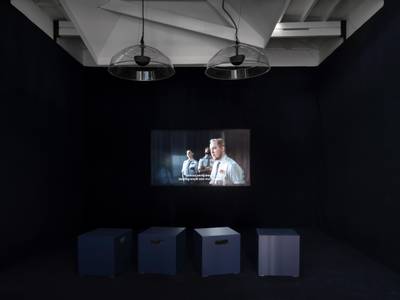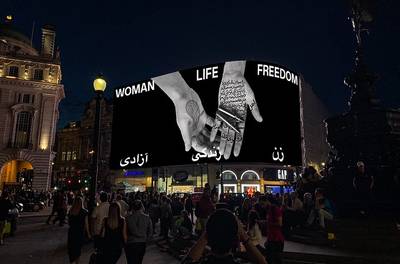

Illustration by Kimberlie Clinthorne-Wong
Ndéla Faye is a journalist and writer. When she’s not wallowing in an existential crisis and getting wound up by capitalism and daily microaggressions, she spends her spare time knitting scarves, cocooning with her family, reading fluffy and spicy romance novels, and leaning into her ‘wellness era’.
Drinks flying through the air. Smashed wine glasses. Snatched weaves. Flipped tables. Catfights. Dramatic storming off. Those are just some of the memorable moments featured in the Real Housewives saga since its first instalment, The Real Housewives of Orange County, first aired in 2006.
Since then, it has grown into an international reality television franchise, with 11 series based in the United States and 21 international series and numerous spin-off series.
I will be the first to put my hands up and admit it: Hi, my name is Ndéla, and I’m hooked on watching The Real Housewives of Anywhere. Give me any city, country, time, or place (except the Cheshire one; that’s where I draw the line, okay!).
Imagine having the morning after ‘morkkis’ (a Finnish term describing the regret you feel after drinking; an after-the-fact embarrassment due to your drunken behaviour; a psychological hangover) on a globally-recognised television show, where your most embarrassing moments are forever immortalised, and become infamous for being some of the juiciest moments in entertainment history.
The Real Housewives franchise has a special place in my heart: it’s a beautiful, messy, infuriating mixture of entertainment and escapism. It’s almost like a twisted sociological experiment where rich people’s vacuous thoughts, money obsessions, and malignant narcissism are exposed.
Somewhere among the casual internalised misogyny, anti-blackness, and slut-shaming (anyone remembers the ill-fated game night of RHOBH in Season 2 when Kim Richards called Brandi Glanville a “slut pig”…) and the sickening levels of wealth and classicism would it be clutching at straws to try to find a feminist angle in it all?
A fine line between escapism and voyeurism
Substance abuse, cheating, domestic violence, and even suicide. These are some of the themes featured in just the Real Housewives of Beverly Hills series. Underneath the glitzy surface, something very dark is lurking.
Imagine having the morning after ‘morkkis’ (a Finnish term describing the regret you feel after drinking; an after-the-fact embarrassment due to your drunken behaviour; a psychological hangover) on a globally-recognised television show, where your most embarrassing moments are forever immortalised, and become infamous for being some of the juiciest moments in entertainment history.
Of course, the cast members’ social clout mostly means that they receive a slap on the wrist – and their mugshot serves merely as a quirky conversation starter at dinner parties rather than a stain that will mar them for the rest of their lives.
At times (well, most of the time), the show’s ethics are highly questionable: the cast and their family members’ substance abuse has been an often-featured storyline throughout the years. There is something morally wrong about watching these women slurring their words and doing things everyone knows they will regret as soon as the dust settles the morning after.
And still, I keep watching the series. Does being a fan of the show make me a bad feminist? Or an even worse anti-capitalist?
After all, the millions of people like me who keep watching these shows are precisely the people who keep these women’s paychecks rolling in. But I suppose that’s the world we live in, where being an influencer is now a career and where opening up parts of your life is the commodity being sold. In this vein, the Real Housewives women are selling us a window into their worlds so that we can see how unattainable (and ridiculous!) it is for us mere mortals.
At times, I feel sleazy, like I’m part of the problem just as much as they are. And that is probably true. After all, the millions of people like me who keep watching these shows are precisely the people who keep these women’s paychecks rolling in. But I suppose that’s the world we live in, where being an influencer is now a career and where opening up parts of your life is the commodity being sold. In this vein, the Real Housewives women are selling us a window into their worlds so that we can see how unattainable (and ridiculous!) it is for us mere mortals.
The show’s format is such that it’s almost mutually beneficial to the women and the show’s producers. According to Radar Online, Nene Leakes was the highest-paid housewife, making $2.85 million (2.6 million euros) per season when she left the show. In a genius neo-liberal plot twist, it’s in the cast’s best interest to keep their storyline relevant and exciting (i.e. as full of drama as possible), or else they will get axed from the show, and someone more volatile will be brought on in a bid to boost viewer ratings.
Despite accusations that the show is manufactured (what else would you call the booze-fuelled holidays and events that are clearly set up or encouraged by the production team?), it could be argued that the Real Housewives franchise allows women to be their most authentic selves. The cameras follow them at their best and their worst, and for some of them, this is the first time they are doing a ‘job’ that gives them financial freedom and independence. There have been cast members (the latest one being Beverly Hills’ Erika Jayne) who have spoken out about experiencing financial abuse by their spouses. Some, like Sonja Morgan, have been open about their financial struggles, bankruptcy, legal woes, and costly divorce proceedings. A part of me wants to believe that the show has helped these women regain control of their lives, but honestly, their overwhelmingly privileged lives mean that I have very little empathy for them on this front.
Of course, it should be noted that not all the cast members are financially dependent on their husbands—and in the New York City series, for example, none of the women is even married, which makes calling them ‘housewives’ slightly questionable.
Colourism
It is no surprise that The Real Housewives of Potomac is considered one of the most ‘explosive’ ones. In my opinion, the cast members are just as messy and shady as the rest, but good ol’ anti-Blackness has us holding Black women to a higher standard than anyone else.
The fact remains that the women of Atlanta and Potomac have often been held to a much higher standard and subjected to meticulous scrutiny for the same disgraceful shenanigans—the wine-tossing and hair-pulling—as their white counterparts and have carried the burden of representation because they are Black. It does seem uncomfortable and unfair that the cast is branded as aggressive, seeing as plenty of white women in the show has physically assaulted other cast members. During the latest Real Housewives of Atlanta season, Candiace Dillard and Wendy Osefo were often referred to as ‘combative’ or ‘aggressive’ by fellow cast members and viewers alike.
The world would indeed be a better place if more people had some level of introspection and the capability to reflect on their possible biases and why only the cast members with dark complexions have received this honorary title.
As Instagram’s Darkest Hue highlights, the Potomac series emphasises palatable features: light-skinned, straight-haired, green-eyed women with a ‘racially ambiguous’ look. There is no denying that proximity to whiteness still grants many biracial, light-skinned and non-black POC opportunities.
Racism
Ever since the Black Lives Matter movement’s resurgence in 2020, the Bravo network, which airs Real Housewives, was quick to inject some diversity into the predominantly white casts. The topic of race started to rear its head in many of the series.
The different editions of the Real Housewives have largely been racially segregated. Atlanta and Potomac are predominantly Black and biracial. At the same time, Orange County, Beverly Hills, New York, Dallas, and New Jersey have been overwhelmingly white, despite the racial diversity of the communities in which they are set.
Garcelle Beauvais and Eboni K. Williams were cast in Beverly Hills and New York City, making them the first Black women to star in those series. It quickly became apparent that their role was to serve as ‘anti-racist educators’ for the clueless white women in the series, who admitted that their exposure to people from diverse backgrounds was limited to their service staff.
By the second episode, Williams was branded ‘angry’ by Luann de Lesseps – and Beauvais was branded as a ‘bully’ by some of her white co-stars. How very original. Both series quickly descended into a game of ‘white fragility and anti-Blackness’-bingo.
We saw an extremely frustrated Beauvais break down and cry over how she felt. She told her co-stars she felt like she didn’t “fit in” among the housewives – which was code for feeling uncomfortable and dismissed by the white cast members.
In New York City, the series becomes increasingly uncomfortable to watch. The statement ‘Black women are expected to carry the weight of the world on their shoulders’ became painfully true as Williams seized the opportunity to attempt to educate Ramona Singer and de Lesseps on concepts such as white fragility microaggressions, and white supremacy. The women, clearly defensive – and bored by Williams’ efforts to educate them – returned the favour by unleashing a barrage of those very things on Williams.
Poor Williams was getting it from all sides, as even ‘The Good White Person’ on the show, Heather Thomson, commended Williams for being very ‘articulate’. Ouch. Later, realising her mistake for having spouted another classic micro-aggression, Thomson was quick to correct herself and stated she meant to call Williams ‘eloquent’. Mmmkay then.
One of the scenes culminated in Singer shouting in Williams’ face, “Am I supposed to apologise for being white?!” which was probably the moment in the series where I wanted to throw something at my television more than ever before. The series’ reunion episode was cancelled due to allegations by Williams that Singer had made offensive comments, and an official investigation was launched into the matter. Eventually, the investigation was dropped as no evidence was found to corroborate Williams’ accusations (even though a crew member had also accused Singer of racism before Williams brought her concerns to light).
Crystal Kung Minkoff and Tiffany Moon soon followed the series’ new diversity trend as the Beverly Hills and Dallas’ first Asian American cast members. Both women have had numerous conversations about race with their white co-stars, including the facepalm-worthy scene where Kung Minkoff explains to Sutton Stracke why the “I don’t see colour” comment she made was offensive.
Among other messy and outright racist incidents, The Real Housewives of Dallas made the headlines when a video from 2017 resurfaced of cast member Brandi Redmond doing a racist impression. She was quick to apologise on social media, and on the show’s Season 5 premiere, Redmond said she spent time at a mental health facility following the resurfacing of the video. In a confessional scene in the episode, she says, “The reaction of people was to cancel me, that I was a horrible person, a horrible mother. I couldn’t say I was sorry enough.” The fear of being ‘cancelled’ seems more traumatic than genuine remorse for being a racist.
The Real Housewives production team quickly responded to viewers’ criticism about the series’ overwhelming whiteness. However, by incorporating “diverse” cast members into a mix of white women who are (mostly) out of touch with reality, the Black and Asian cast members were put in unsafe situations, where they faced micro– and macro-aggressions one after the other. Did anyone expect anything else from the wine-by-the-gallon-swigging millionaire ladies with loose cannon personalities?
The series’s latest instalment, The Real Housewives of Dubai, is set to air in June. Fans have already called out the series for overlooking the city’s human rights violations. But isn’t that very much ‘on-brand’ for the rest of the series that thrives on entitlement, obscene wealth, endless pot-stirring, and a complete lack of awareness of how the real world works?
Can a show like this ever be inclusive or socially conscious?
The show’s foundation is based on showing some of the ugliest parts of our society, capitalism, and the white supremacy it relies on.
One of the biggest ironies is that these women, who spend so much of their time trying to portray a polished image of themselves and their lives, often end up divulging their ugliest parts as a result.
Somewhere among all the rubble, I can stretch myself to say that, ultimately, it’s also a show about friendship. (My favourite BFFs are probably Orange County’s Gina Kirschenheiter and Emily Simpson). There are glimpses of authenticity among all the fakeness and cattiness, and those moments feel wholesome, even though they may be fleeting. The idea of ‘authenticity’ often crops up during the show. There are long-winded speculations about who is being fake and who is being authentic – and the fact that viewers are drawn into this weird ‘are-they-or-aren’t-they-being-fake’ -charade is part of why we (or I at least!) keep watching.
One of the biggest ironies is that these women, who spend so much of their time trying to portray a polished image of themselves and their lives, often end up divulging their ugliest parts as a result.
In the series’ 100th episode special, The Real Housewives of New York’s Aviva Drescher revealed to host Andy Cohen that the moment she is most known for (throwing her artificial leg on the table during a confrontation) had been premeditated and that she had discussed it with the production team. Other cast members have also commented on the show being “produced” and “edited”. I believe that the earlier series may have been edited and heavily steered by the producers – but in recent years, the producers seem to rely on the format of casting women who are known for their volatile antics, mixed with regularly exposing them to copious amounts of alcohol – and ta-da! Suddenly, the show writes itself.
But do we watch the shows for their authenticity? Or for their fakeness?
Part of the show’s whole allure is watching the car crash in front of our eyes when cameras follow privileged women, who are so utterly out of touch with how the real world works that they might as well be extraterrestrials. The imperfections—the cracks beneath it all—make the show so compelling to watch.







